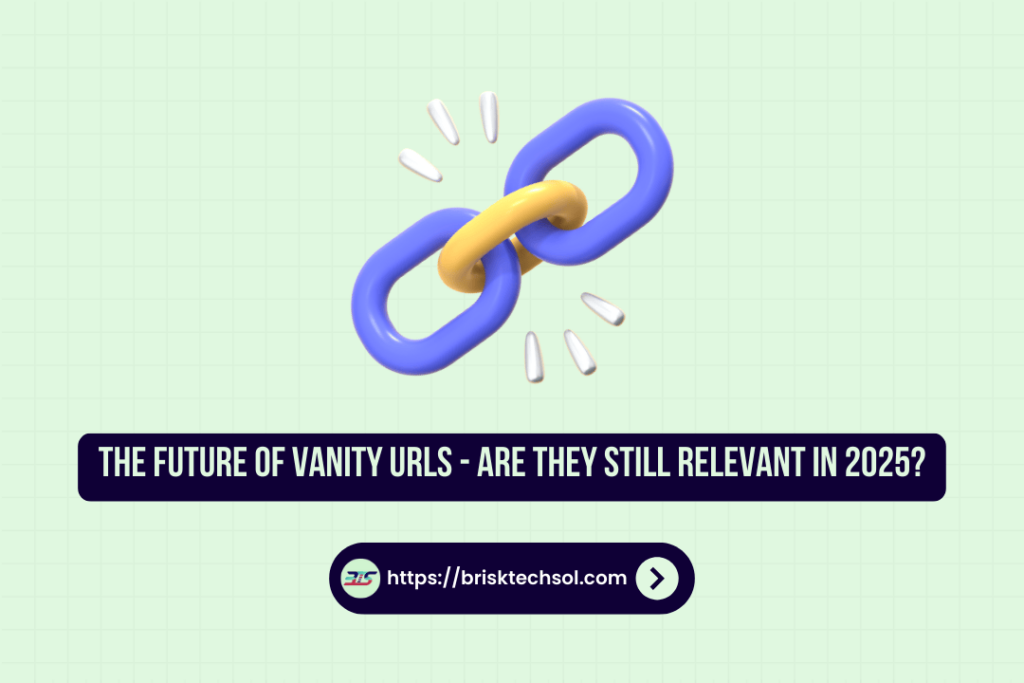The way brands show themselves on the internet is changing quickly. Vanity URLs short and memorable web addresses have long helped brands stand out and support marketing efforts. But as we reach 2025, many business owners wonder: Are vanity URLs still useful? In this article, we will look at the history of vanity URLs, their current role, the problems they might face, and what the future could bring for these custom web addresses.
What Are Vanity URLs?
Vanity URLs are custom web addresses that are designed to be short, easy to remember, and tied closely to your brand. Instead of a long, complicated link, vanity URLs often include the brand name or a key phrase that represents the business.
Key Features of Vanity URLs
- Brand Identity: They help show off your brand by including familiar words or names.
- Memorability: Short URLs are easier for people to remember and share.
- Trust and Credibility: A neat URL can make potential customers feel more confident in your business.
- Marketing Benefit: They work well in ads, social media, and other promotions.
How Do Vanity URLs Work?
Vanity URLs usually work by redirecting users from a simple address to a longer, more detailed page. For example, a company with the website www.example.com might use a vanity URL like www.exampledeals.com to lead visitors to a special offer or campaign page. This redirection makes it easier for users and helps keep the brand message clear.
The History of Vanity URLs
Vanity URLs have been used in online marketing for many years. Over time, their role and style have changed with new technology and different ways people use the internet.
Early Days
- The Early 2000s: Vanity URLs became popular when companies began to see the value in having simple links for word-of-mouth marketing.
- Mid-2000s to Early 2010s: With the rise of social media, these easy-to-remember URLs became even more important.
- After 2010: With smartphones and better search engines, vanity URLs grew more advanced. Now, they can include tools that track how well a campaign is doing.
Impact of Social Media and Mobile Use
Social media has changed the way brands connect with their audience. Vanity URLs are a big part of many social media campaigns on sites like Facebook, Twitter, Instagram, and LinkedIn. Their ability to get a message across quickly keeps them useful, even as online trends change.
SEO and Marketing Strategies
Search engines now pay more attention to how URLs are set up. While vanity URLs were first used mainly for branding, they now also help improve search rankings. A clear and simple URL can lead to more clicks, especially when users see a friendly and easy-to-read address.
The Benefits of Using Vanity URLs in 2025
Even with many changes online, vanity URLs still offer several advantages for brands and marketers. Here are some reasons why they remain a useful tool in 2025.
Better Brand Recognition
Vanity URLs make it easier for people to remember your website, which can lead to more direct visits. When a URL clearly shows your brand or campaign, it makes a lasting impression.
- Easy Recall: A simple URL helps people remember where to go without needing to search for it again.
- Consistent Branding: Including your brand name in the URL strengthens your identity in all your marketing.
Enhanced Marketing Campaigns
Using vanity URLs in ads and promotions can boost engagement. They not only look clean and professional but also give a clear call to action.
- Simple to Share: People are more likely to share a short, catchy URL than a long one.
- Tracking and Insights: Vanity URLs can be combined with tracking tools to see how well a campaign is doing.
SEO Benefits
While vanity URLs are just one part of a strong SEO strategy, they can still help when used the right way.
- More Clicks: Clean URLs in search results can attract more clicks from users.
- Keyword Use: Adding relevant words in your URL can give a small boost to your search engine ranking.
Better User Experience and Trust
A well-made vanity URL can improve how users feel about your site, building trust and confidence.
- Professional Look: A simple URL shows that you care about details.
- Less Confusion: Users are more likely to trust a URL that is clear and easy to read.
Challenges Facing Vanity URLs Today
Even though vanity URLs offer many benefits, there are some problems to be aware of as online trends change.
Security Concerns
- Phishing Risks: Bad actors can create similar-looking URLs to trick users. How can companies make sure their vanity URLs are safe and easy to tell apart?
- SSL Certification: Making sure that vanity URLs have proper security certificates is key to keeping user data safe.
Too Many Options and Brand Confusion
As more companies use vanity URLs, the internet can feel crowded with similar links.
- Less Impact: With many brands using vanity URLs, it might be harder to stand out. How can businesses make sure their URLs stay unique?
- User Confusion: When similar vanity URLs exist in the same field, people might get confused about which one is the real deal.
Keeping Up with Many URLs
Managing many vanity URLs for different campaigns can be tricky.
- Tracking Performance: As companies grow, keeping track of many vanity URLs may require better tools.
- Regular Updates: Out-of-date or broken vanity URLs can hurt a brand’s image. How can companies keep their URLs current and effective?
Fitting in With Modern Online Platforms
With the rapid change in online marketing, vanity URLs must work well with new tools and sites.
- Social Media: As social platforms update their features, vanity URLs need to work smoothly with these changes.
- Mobile Use: With more people using smartphones, vanity URLs must work well on all devices.
What the Future Holds for Vanity URLs
What new trends might shape vanity URLs in 2025 and beyond?
Personalization and Changing URLs
As more user data becomes available and tracking tools improve, making URLs more personal is becoming a focus.
- Changing Vanity URLs: Companies might start using vanity URLs that change based on what users do or how a campaign is performing. Could this make the user experience more personal?
- Real-Time Insights: Adding live tracking to vanity URLs could help marketers make quick changes to improve their campaigns.
Working with Artificial Intelligence (AI)
AI is changing how businesses use data and interact with customers. The future of vanity URLs could include more use of AI.
- Predicting Success: AI might help guess which vanity URLs will get the best response from users. Can AI help marketers choose the best URL setups?
- Automated URL Creation: Soon, tools powered by AI might create the best vanity URLs based on current trends and user habits, reducing the need for manual work.
Using Blockchain for Better Security
With online security being more important than ever, using blockchain could provide a safer way to manage vanity URLs.
- Building Trust: Blockchain could help confirm that a vanity URL is genuine, making it harder for scammers to copy.
- Better Management: A decentralized system using blockchain might help protect vanity URLs from cyber-attacks and unwanted changes.
Consistency Across Different Platforms
Keeping the same style and message across all online platforms will continue to be important.
- Unified Branding: As companies grow online, it’s important to use the same vanity URLs on social media, websites, and mobile apps.
- Flexible Design: Vanity URLs will need to work well on screens of all sizes without losing their clarity or function.
The Impact of Voice Search
With more people using voice assistants like Siri, Alexa, and Google Assistant, vanity URLs might change to work better with voice commands.
- Voice-Friendly URLs: Brands may need to create vanity URLs that are easy to say and understand by voice assistants.
- Conversational Marketing: As voice search grows, using vanity URLs in friendly, conversation-like ways might become more common.
Real-Life Examples and Success Stories
Looking at real-life examples can help us see how vanity URLs work well for many companies.
Big Tech Companies
- Apple: Known for its simple style, Apple uses easy-to-remember URLs for its product releases and support pages.
- Google: With a strong focus on user experience, Google shows how clean URLs can help users quickly find what they need.
E-Commerce and Retail
- Amazon: Amazon uses vanity URLs to guide users to special offers and seasonal promotions. How does this simple approach help boost sales?
- Etsy: This online marketplace uses vanity URLs to help individual sellers shine, making it easier for customers to trust and remember their pages.
Media and Entertainment
- Netflix: When Netflix launches new shows or special content, they often create short URLs to drive more user interest. How do these links help create buzz?
- Spotify: Spotify uses vanity URLs for personalized playlists and events, making their links easy to share and remember.
Small Businesses and Startups
Many small businesses and startups use vanity URLs to compete with bigger brands. For example, local restaurants might use custom URLs for online ordering, and boutique shops might promote limited-time offers with memorable links. Could these simple strategies lead to greater success?
FAQ’S
What are vanity URLs and why are they useful?
Vanity URLs are custom web addresses that are short and easy to remember. They help build your brand, make your site easier to find, and boost your marketing efforts?
How do vanity URLs help with search engine results?
They can attract more clicks in search results by looking clean and friendly. Plus, including keywords in them can signal what your page is about?
Are vanity URLs still useful in 2025?
Yes, they remain useful as they adapt to trends like personalization, AI tools, and improved security, helping promote your brand effectively?
What challenges might vanity URLs face today?
Some challenges include security risks, the crowding of similar URLs, and the need for regular updates. How can businesses overcome these issues?
Can vanity URLs be customized for different users?
Yes, with new tools and personalization methods, vanity URLs can be adjusted to suit different user needs and habits?
How can blockchain improve vanity URLs?
Blockchain can verify that a vanity URL is genuine, reducing scams. Could this approach become a common way to manage web addresses?
How do vanity URLs work with social media campaigns?
They’re simple to share, helping to keep your brand message consistent and allowing you to track campaign success?









